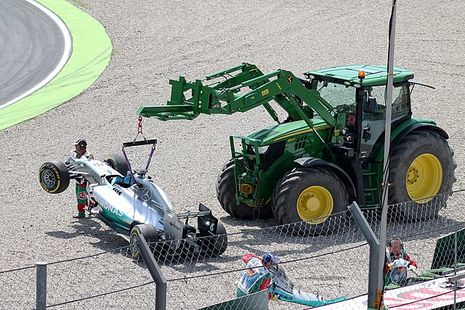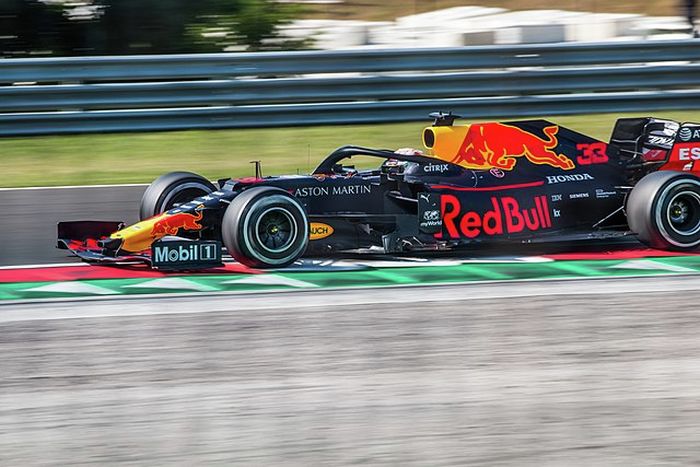Formula 1: To boo or not to boo?
Building on the debates surrounding raucous fan behaviour in Formula One, Ayushman Nath argues that such misconduct polarises the sport and makes it less inclusive

Transcending category or event, booing is ubiquitous in world sport: a means of riling up your opposition by showing off your dislike or contempt in the hopes that they succumb to the pressure. Intrinsically tied to success, many “blockbuster” sports stars have faced some form of jeering or booing throughout their career – notably the likes of Paul Pogba, Nick Kyrgios and LeBron James. For the most part, booing is societally acceptable – but where do we draw that line?
“Is it right to boo drivers that risk their lives every time they step into the car when it is all ultimately for your entertainment?”
Recent events in Formula One have clouded this debate – with the booing of drivers and cheering of high-profile crashes drawing dismay from drivers and pundits alike. The 2021 season exemplifies this: the year-long duel between Lewis Hamilton and Max Verstappen caused viewing figures to explode but also brought in an increasingly partisan fanbase. The drama and tension peaked in July at the British Grand Prix where the two championship contenders collided; Max Verstappen sent spearing into the wall at well over 150mph with an impact force of 51G (for comparison, astronauts experience a vertical launch force of 6G). Despite many fans understanding the gravity of the accident – which put Verstappen in hospital overnight for precautionary concussion checks – some Hamilton supporters in the crowd did still vociferously cheer the crash. This flashpoint catalysed a season of toxicity between the two fan groups, who booed the opposite driver at any available opportunity.
“Cheering serious crashes should not be acceptable in any form of motor racing”
So why write this article in 2022, seven months after last season’s controversial finish? This year, Verstappen and Hamilton are fighting completely different battles, Verstappen locked in a championship tussle with Ferrari’s Charles Leclerc and Hamilton stuck in the midfield after Mercedes couldn’t perfect this year’s regulation changes. As they’re no longer in direct competition, that ought to stop the booing?
A year later, the British Grand Prix crowd was no friendlier to Verstappen, arguably even more hostile: jeering his television interviews; cheering every time he was overtaken and even showing off their delight when he received a suspected puncture and had to pit. The nature of booing in a team sport like football is fundamentally different to booing in Formula One – where the boos and jeers are directed at one driver rather than a whole team. F1 drivers bear life-threatening risk with their profession – the huge aerial crash just 10 seconds into the Silverstone race being a stark reminder of this.
As such, is it right to boo drivers that risk their lives every time they step into the car when it is all ultimately for your entertainment? More so than that, is it right to cheer when they crash, particularly when it’s unclear whether the driver will be okay or not? Proponents of booing would argue that this danger element is part and parcel of the job and the multi-million dollar salary that comes with it.
Seemingly, F1 is the only professional sport where booing is frowned upon but discerning why this might be the case is a trickier question. The added risk component is present in all forms of motorsport, but the elitist, ‘gentlemen’s club’ nature of F1 might be a contributing factor. A weekend at Silverstone costs £500 – roughly the same as the cheapest Manchester City season ticket.
Consequently, F1’s ticket holders have traditionally skewed towards the wealthy – who might find booing uncouth. However, given the price of a ticket, do fans not have the right to express their feelings and passions towards what they see on the track, particularly as booing isn’t physically harming the drivers (as opposed to throwing objects or invading the track)? After all, if fans don’t want to interact with the drivers in any way, they can watch the race from home.
This isn’t the first time F1 fans have been rebuked for booing drivers – Sky F1 commentator (and ex-driver) Martin Brundle famously told off fans booing Sebastian Vettel on the podium of the 2013 Singapore Grand Prix, yet this instance represented the standard success-fuelled booing that is prevalent in any major sport.
As such, drawing the line on the acceptability of booing requires a distinction to be made between indiscriminate booing and booing in reference to specific on-track events. Naturally, booing isn’t desirable but its latter form should be accepted as a form of self-expression – of course, you’re not going to be best pleased if somebody else crashes out your favourite driver and as a paying fan. And you should be entitled to voice your disapproval at that. However, indiscriminate booing – where the driver is booed for their success or despite having done nothing wrong – is more questionable. Indeed, the reputation of the British crowd in the eyes of F1’s global audience will have been damaged by the events of the Grand Prix, especially the perseverance to voice their dislike of Verstappen in spite of Hamilton’s plea to the fans not to boo another driver.
Most of all, cheering serious crashes should not be acceptable in any form of motor racing – it only takes a brief look at F1’s often tragic history to realise that the cruelty of voicing joy at such an incident could have life-changing repercussions for those involved. From those that cheered Hamilton’s crash at last weekend’s Austrian Grand Prix to those at Silverstone last year, fan behaviour to serious crashes needs to change to preserve the welcoming nature of the sport’s fan base – preserving the growth of the sport, and the community surrounding, it for the future.
 Features / Should I stay or should I go? Cambridge students and alumni reflect on how their memories stay with them15 December 2025
Features / Should I stay or should I go? Cambridge students and alumni reflect on how their memories stay with them15 December 2025 News / Cambridge study finds students learn better with notes than AI13 December 2025
News / Cambridge study finds students learn better with notes than AI13 December 2025 Comment / The magic of an eight-week term15 December 2025
Comment / The magic of an eight-week term15 December 2025 News / News In Brief: Michaelmas marriages, monogamous mammals, and messaging manipulation15 December 2025
News / News In Brief: Michaelmas marriages, monogamous mammals, and messaging manipulation15 December 2025 News / Uni Scout and Guide Club affirms trans inclusion 12 December 2025
News / Uni Scout and Guide Club affirms trans inclusion 12 December 2025










